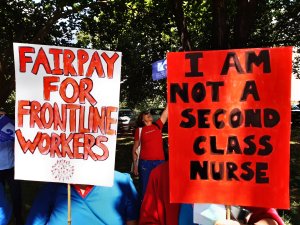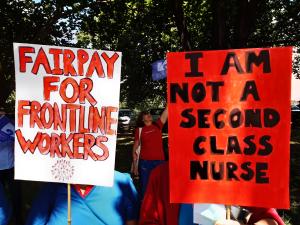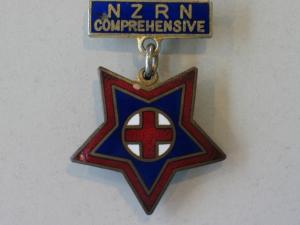Respiratory physician Lutz Beckert considers chronic obstructive pulmonary disease management, including the prevention of COPD, the importance of smoking cessation and pulmonary rehabilitation, and the lifesaving potential of addressing treatable traits. He also discusses the logic of inhaler therapy, moving from single therapy to dual and triple therapy when indicated, as well as other aspects of management
Looming $20,000 practice nurse pay gap: Minister says no quick solution
Looming $20,000 practice nurse pay gap: Minister says no quick solution

“I think [withdrawing from zero fees] becomes a more and more palatable and reasonable option looking at the situation we are in”
Health minister Andrew Little is offering little hope of a quick funding response to the looming $20,000 pay gap between an experienced practice nurse and their DHB counterpart.
The DHB nurse pay equity settlement, currently stalled, proposes a top basic pay step of $95,340 compared with the top step in the practice nurse pay agreement of about $75,000.
New Zealand Nurses Organisation kaiwhakahaere Kerri Nuku says the nursing union is also concerned about the even larger parity gap facing nurses working for Māori, iwi and Pacific providers and in residential aged care.
The General Practice Owners Association chair Tim Malloy wrote to the minister in mid-April saying the pay gap would cause an “instant, increased and significant exodus” of its nursing workforce. He also suggested if pay parity was not addressed by additional capitation funding then GenPro members may increase fees and withdraw from current zero and capped patient fee schemes.
The minister responded late last month to GenPro saying he understood the workforce implications of pay parity for primary healthcare services.
He said the Ministry of Health was developing a pay-parity framework and processes but the work is complex and “will take some time to complete within primary healthcare settings”.
“It is important we take a careful and considered approach, with a focus on achieving a sustainable long-term solution.”
Mr Little acknowledged practices’ important role in population-based care and “strongly encouraged” practices to continue to provide low-cost and zero-fees access to their high-needs populations.
He wrote he had been advised that interim Health New Zealand’s review of capitation formula issues would be completed in June. At this point, evaluating options for addressing primary care funding would commence as a “key piece of work” for both interim Health NZ and the interim Māori Health Authority.
NZMA GP Council and Contracted Provider Caucus chair Vanessa Weenink says with many general practices employing senior nurses, the $20,000 pay gap would have a “huge” impact on the sector.
She says GPs believe nurses deserve to be paid well and if the Government is not forthcoming with pay-parity funding then withdrawing from zero fee schemes is a “serious consideration”.
“If we’re needing to pay our nurses more because of the pressures that are being put on us we need to get that money from somewhere.”
She says quite a few practices have already taken up the option of withdrawing from the zero-fees aspect of their contracts and charge part-fees instead. She says zero fees drives a lot of over use in the under-14 age group without targeting those who actually need it.
“I think [withdrawing from zero fees] becomes a more and more palatable and reasonable option looking at the situation we are in.”
Ms Nuku says mixed messages are being sent by the Government on funding nurse pay parity for non-DHB nurses, including practice nurses.
She says, while associate health minister Peeni Henare has said “absolutely” all nurses should be paid the same, Mr Little says there’s no more money than that set aside for DHB pay equity.
“It’s not okay that we potentially have one group that settles getting a significant increase in their pay and the rest of the sector doing the same work getting less.”
Ms Nuku says once the DHB nurses do settle a pay equity deal then NZNO was going to use its collective voice to support the nursing sectors, like general practice and Māori, iwi and Pacific providers, who are missing out.
“We are ramping up some strong action to put pressure on the Government to bring about this change a lot quicker.”
She says pay parity is even a more of an issue for Māori, iwi and Pacific providers, who have even less of a voice than general practice nurses, and continue to slip further behind.
Ms Nuku says it will be interesting to see whether under the health reforms there will eventually be one nursing pay agreement across all Health NZ and Māori Health Authority-funded sectors but who would fund the current pay variance?
Ratifying the proposed DHB nursing pay-equity settlement, that has been four years in the making, is currently stalled.
The settlement was released on 8 April and proposes sizeable pay rises for DHB nurses, from March 2022, with lump-sum payments in lieu of the 31 December 2019 back-pay date agreed to in 2018 pay agreements.
The proposed basic seven-step pay scale would see new graduates start on $66,570 and go to $95,340. There is also a senior nurse pay scale including a new nurse practitioner pay scale of $120,028 to $143,718.
NZNO is polling affected members until 9 May over whether to ask the Employment Relations Authority to determine whether the proposed deal breaches the existing back-pay agreements or to proceed to ratification, but only after settling a revised final proposal that addresses members’ back pay and other raised concerns.
Meanwhile, pay parity funding issues are hampering the ongoing negotiations of a new NZNO primary health care multi-employer collective agreement.
We're publishing this article as a FREE READ so it is FREE to read and EASY to share more widely. Please support us and the hard work of our journalists by clicking here and subscribing to our publication and website







![Barbara Fountain, editor of New Zealand Doctor Rata Aotearoa, and Paul Hutchison, GP and senior medical clinician at Tāmaki Health [Image: Simon Maude]](/sites/default/files/styles/thumbnail_cropped_100/public/2025-03/Barbara%20Fountain%2C%20editor%20of%20New%20Zealand%20Doctor%20Rata%20Aotearoa%2C%20and%20Paul%20Hutchison%2C%20GP%20and%20senior%20medical%20clinician%20at%20T%C4%81maki%20Health%20CR%20Simon%20Maude.jpg?itok=-HbQ1EYA)
![Lori Peters, NP and advanced health improvement practitioner at Mahitahi Hauora, and Jasper Nacilla, NP at The Terrace Medical Centre in Wellington [Image: Simon Maude]](/sites/default/files/styles/thumbnail_cropped_100/public/2025-03/2.%20Lori%20Peters%2C%20NP%20and%20advanced%20HIP%20at%20Mahitahi%20Hauora%2C%20and%20Jasper%20Nacilla%2C%20NP%20at%20The%20Terrace%20Medical%20Centre%20in%20Wellington%20CR%20Simon%20Maude.jpg?itok=sUfbsSF1)
![Ministry of Social Development health and disability coordinator Liz Williams, regional health advisors Mary Mojel and Larah Takarangi, and health and disability coordinators Rebecca Staunton and Myint Than Htut [Image: Simon Maude]](/sites/default/files/styles/thumbnail_cropped_100/public/2025-03/3.%20Ministry%20of%20Social%20Development%27s%20Liz%20Williams%2C%20Mary%20Mojel%2C%20Larah%20Takarangi%2C%20Rebecca%20Staunton%20and%20Myint%20Than%20Htut%20CR%20Simon%20Maude.jpg?itok=9ceOujzC)
![Locum GP Helen Fisher, with Te Kuiti Medical Centre NP Bridget Woodney [Image: Simon Maude]](/sites/default/files/styles/thumbnail_cropped_100/public/2025-03/4.%20Locum%20GP%20Helen%20Fisher%2C%20with%20Te%20Kuiti%20Medical%20Centre%20NP%20Bridget%20Woodney%20CR%20Simon%20Maude.jpg?itok=TJeODetm)
![Ruby Faulkner, GPEP2, with David Small, GPEP3 from The Doctors Greenmeadows in Napier [Image: Simon Maude]](/sites/default/files/styles/thumbnail_cropped_100/public/2025-03/5.%20Ruby%20Faulkner%2C%20GPEP2%2C%20with%20David%20Small%2C%20GPEP3%20from%20The%20Doctors%20Greenmeadows%20in%20Napier%20CR%20Simon%20Maude.jpg?itok=B0u4wsIs)
![Rochelle Langton and Libby Thomas, marketing advisors at the Medical Protection Society [Image: Simon Maude]](/sites/default/files/styles/thumbnail_cropped_100/public/2025-03/6.%20Rochelle%20Langton%20and%20Libby%20Thomas%2C%20marketing%20advisors%20at%20the%20Medical%20Protection%20Society%20CR%20Simon%20Maude.jpg?itok=r52_Cf74)
![Specialist GP Lucy Gibberd, medical advisor at MPS, and Zara Bolam, urgent-care specialist at The Nest Health Centre in Inglewood [Image: Simon Maude]](/sites/default/files/styles/thumbnail_cropped_100/public/2025-03/7.%20Specialist%20GP%20Lucy%20Gibberd%2C%20medical%20advisor%20at%20MPS%2C%20and%20Zara%20Bolam%2C%20urgent-care%20specialist%20at%20The%20Nest%20Health%20Centre%20in%20Inglewood%20CR%20Simon%20Maude.jpg?itok=z8eVoBU3)
![Olivia Blackmore and Trudee Sharp, NPs at Gore Health Centre, and Gaylene Hastie, NP at Queenstown Medical Centre [Image: Simon Maude]](/sites/default/files/styles/thumbnail_cropped_100/public/2025-03/8.%20Olivia%20Blackmore%20and%20Trudee%20Sharp%2C%20NPs%20at%20Gore%20Health%20Centre%2C%20and%20Gaylene%20Hastie%2C%20NP%20at%20Queenstown%20Medical%20Centre%20CR%20Simon%20Maude.jpg?itok=Z6u9d0XH)
![Mary Toloa, specialist GP at Porirua and Union Community Health Service in Wellington, Mara Coler, clinical pharmacist at Tū Ora Compass Health, and Bhavna Mistry, specialist GP at Porirua and Union Community Health Service [Image: Simon Maude]](/sites/default/files/styles/thumbnail_cropped_100/public/2025-03/9.%20Mary%20Toloa%2C%20Porirua%20and%20Union%20Community%20Health%20Service%20in%20Wellington%2C%20Mara%20Coler%2C%20T%C5%AB%20Ora%20Compass%20Health%2C%20and%20Bhavna%20Mistry%2C%20PUCHS%20CR%20Simon%20Maude.jpg?itok=kpChr0cc)